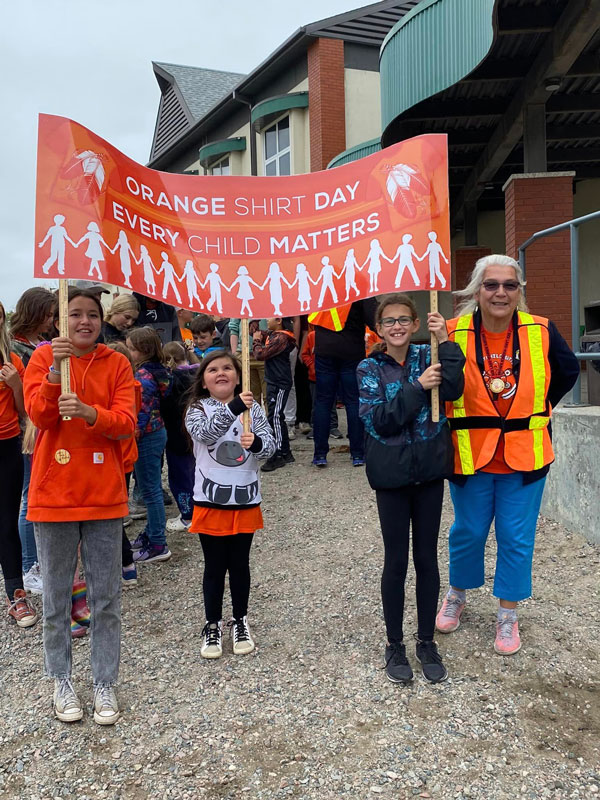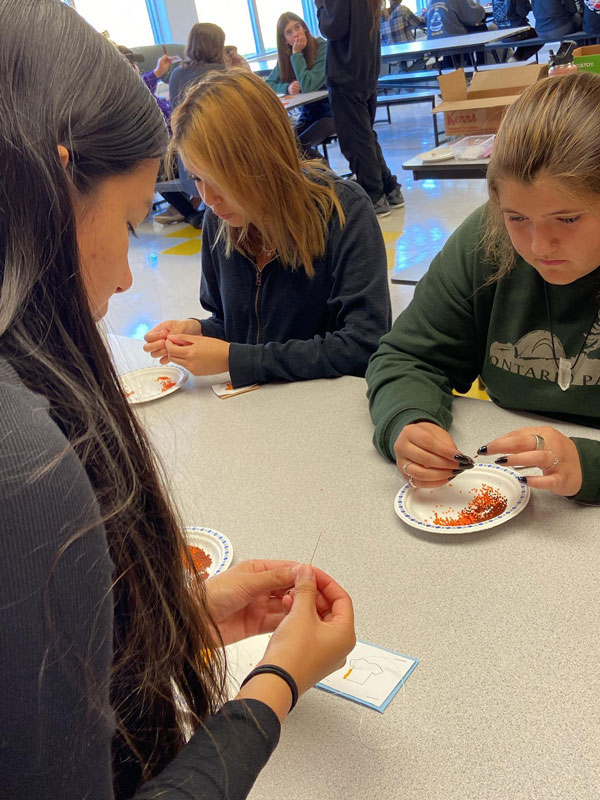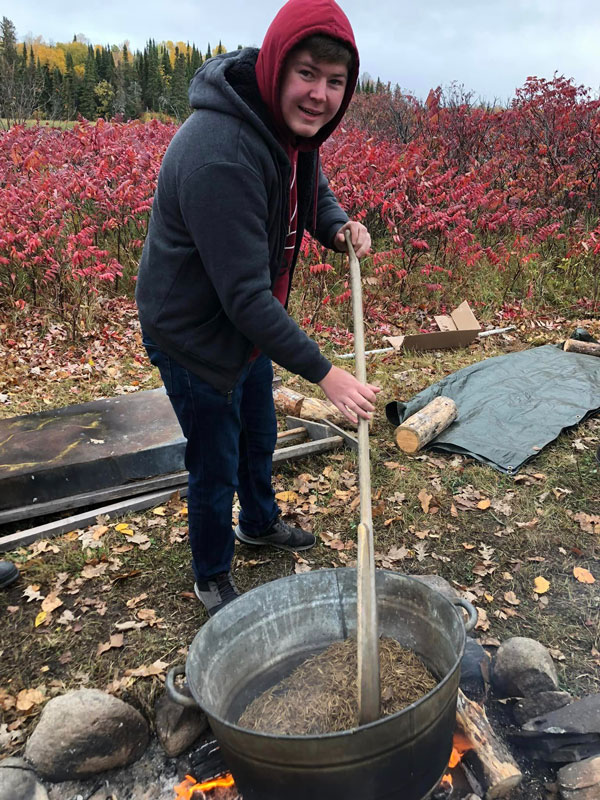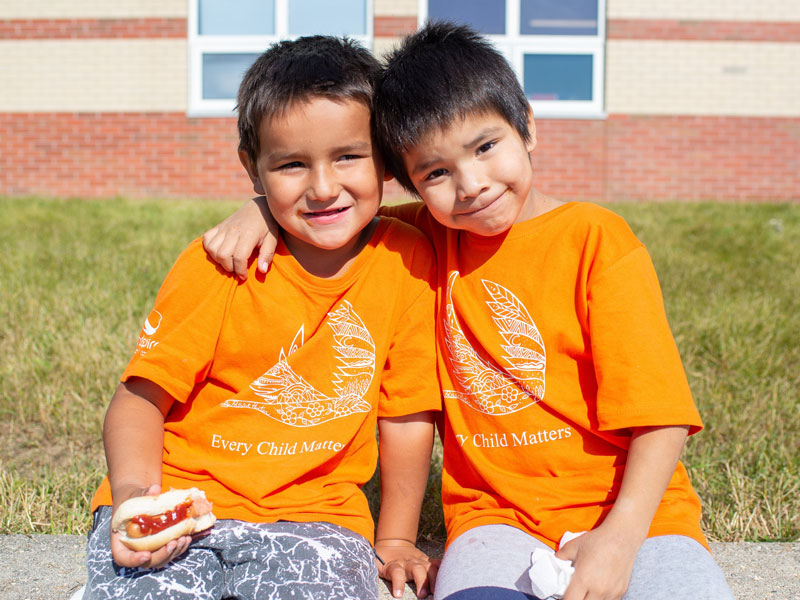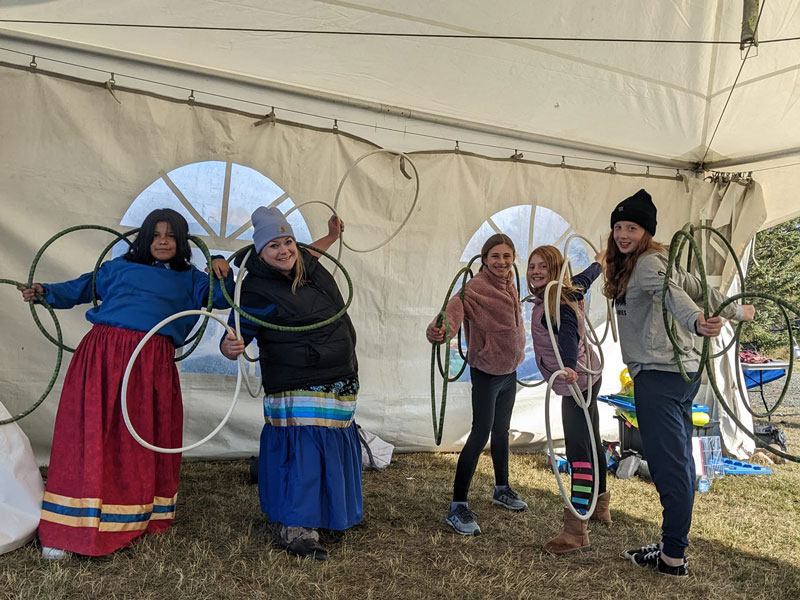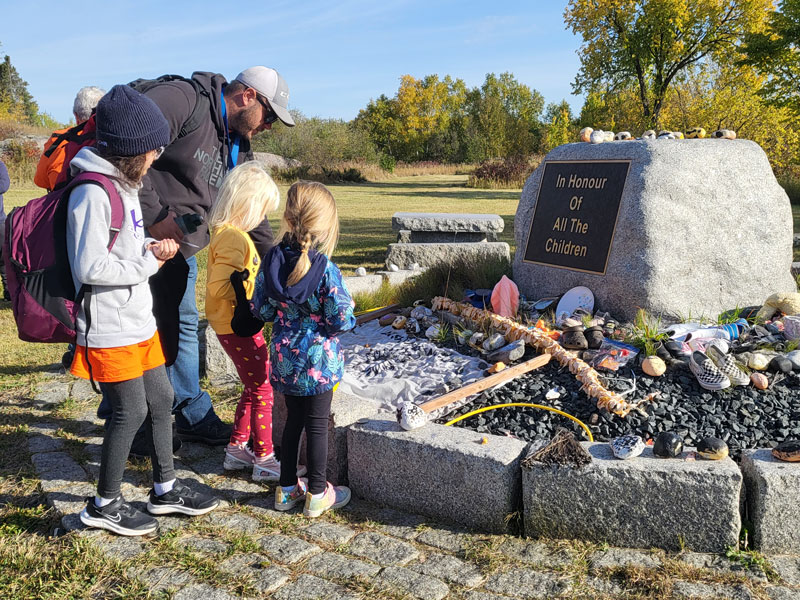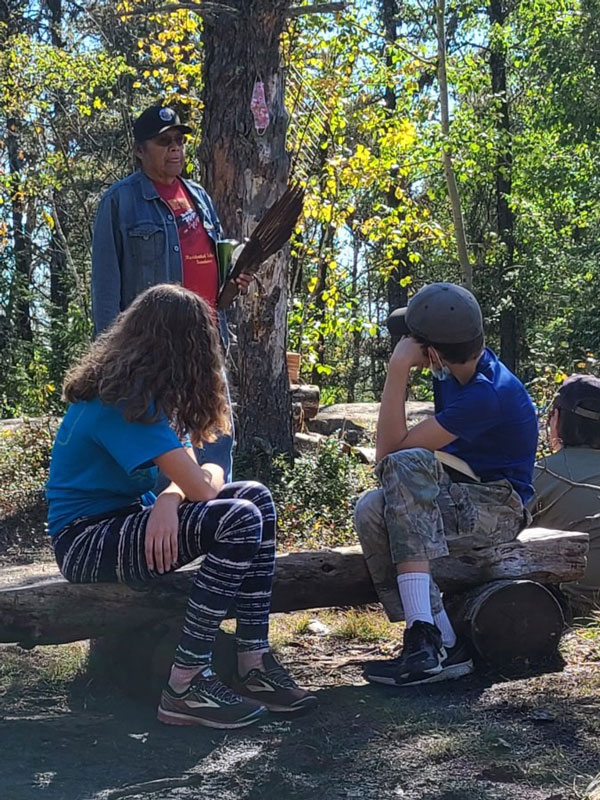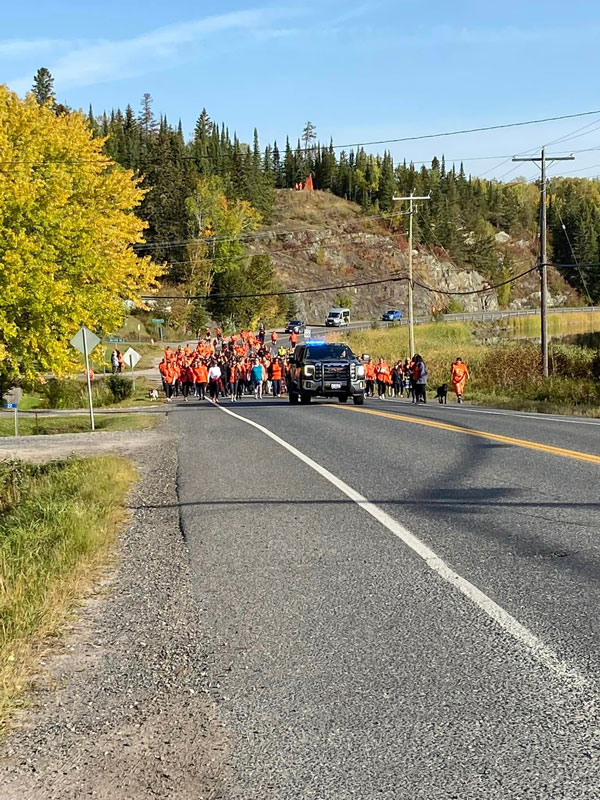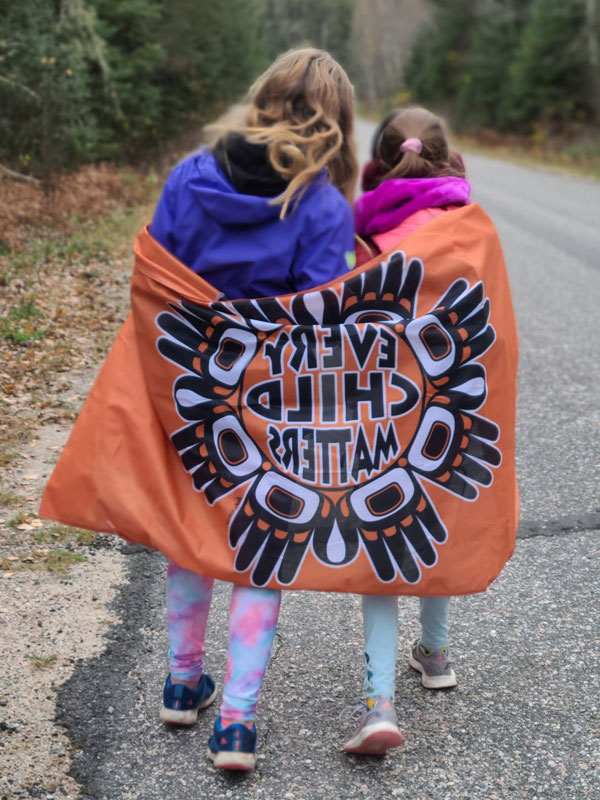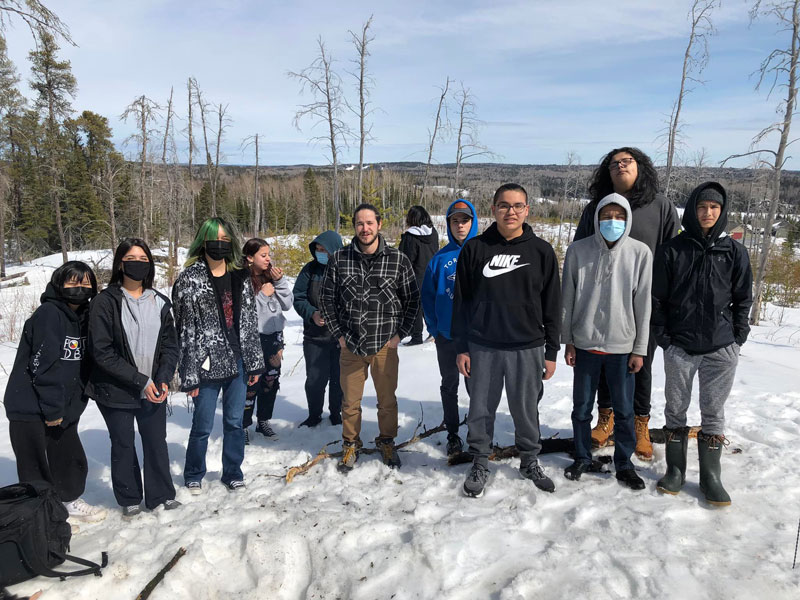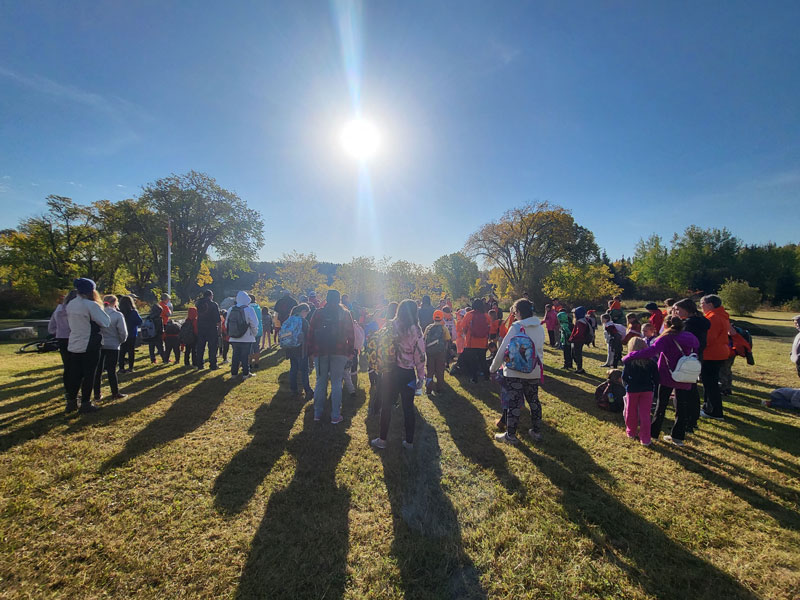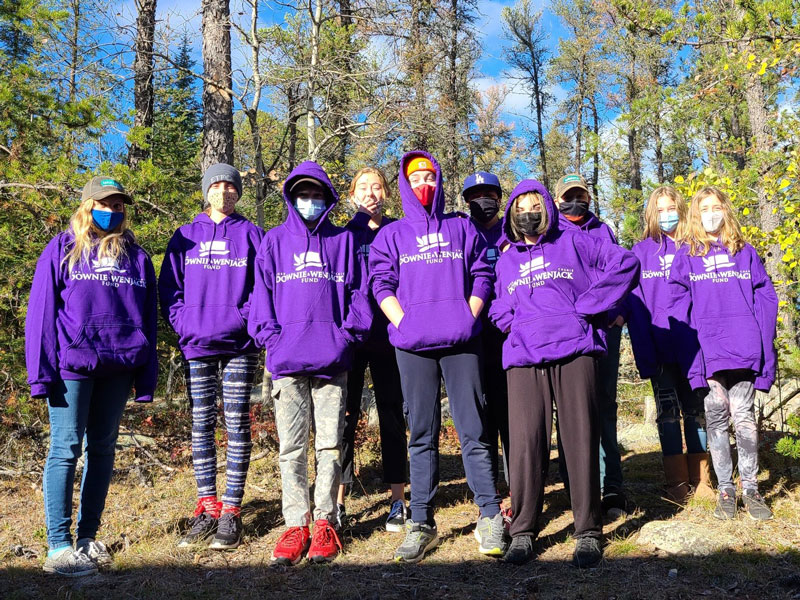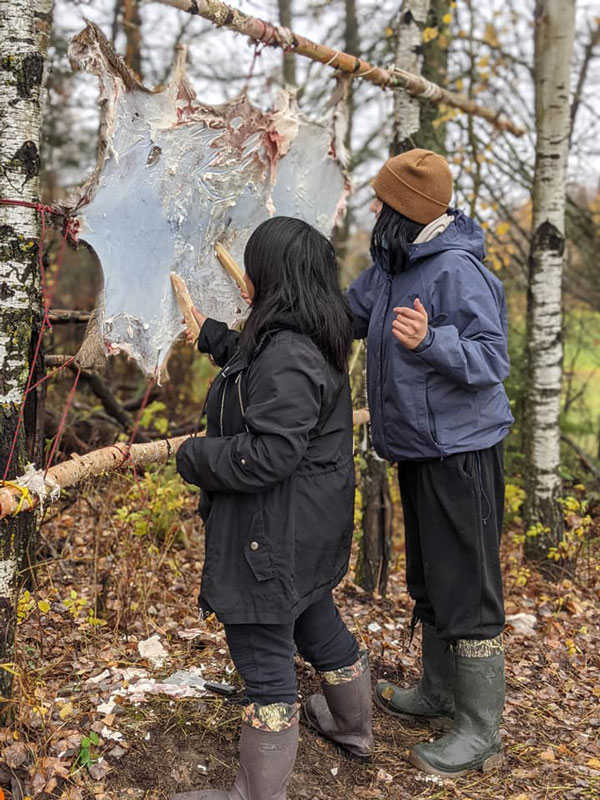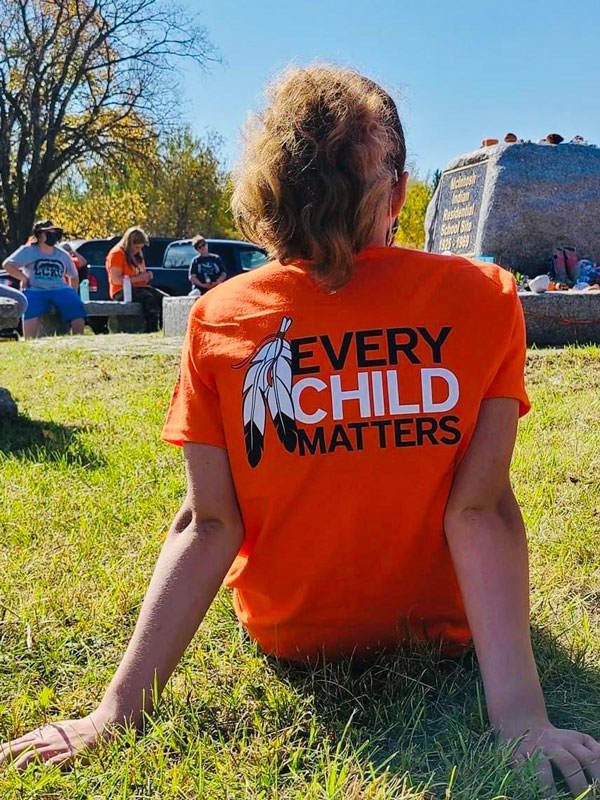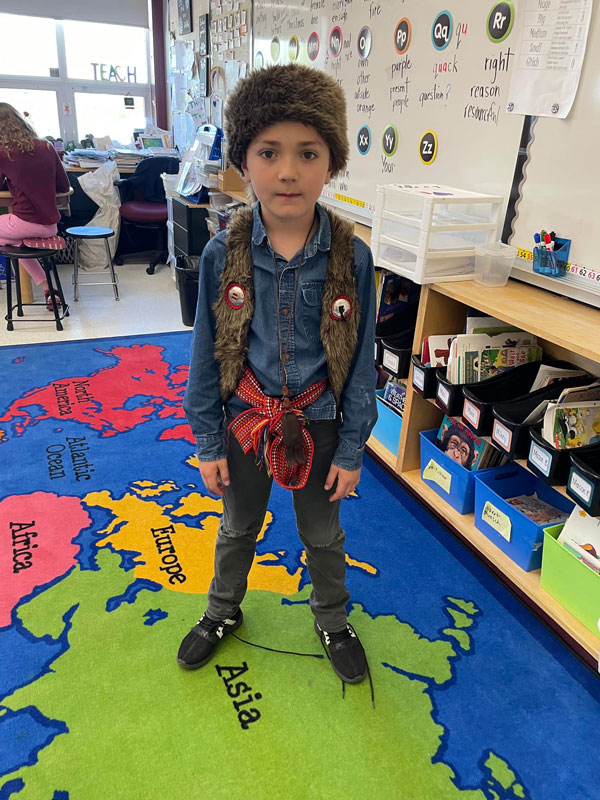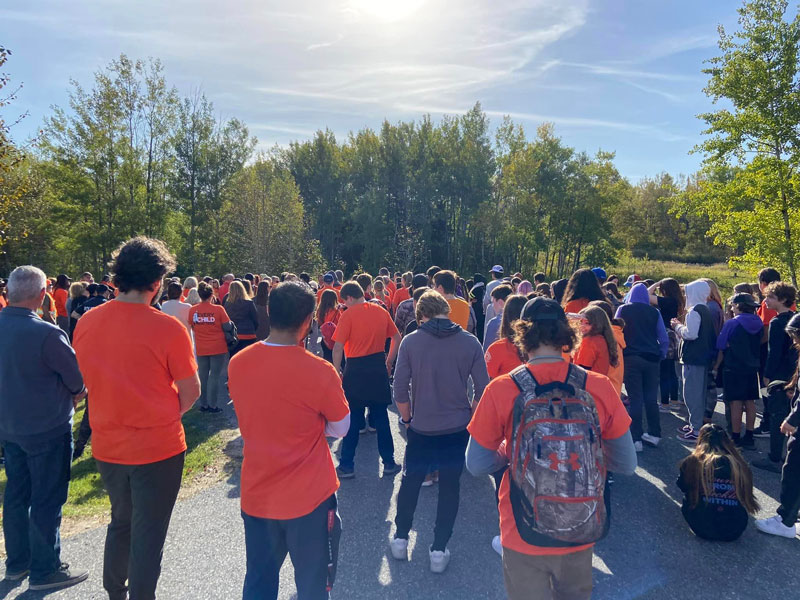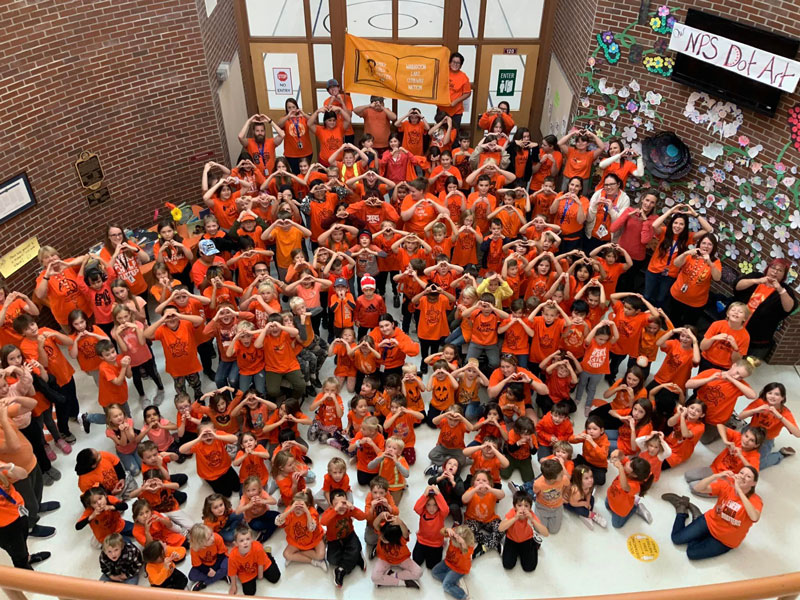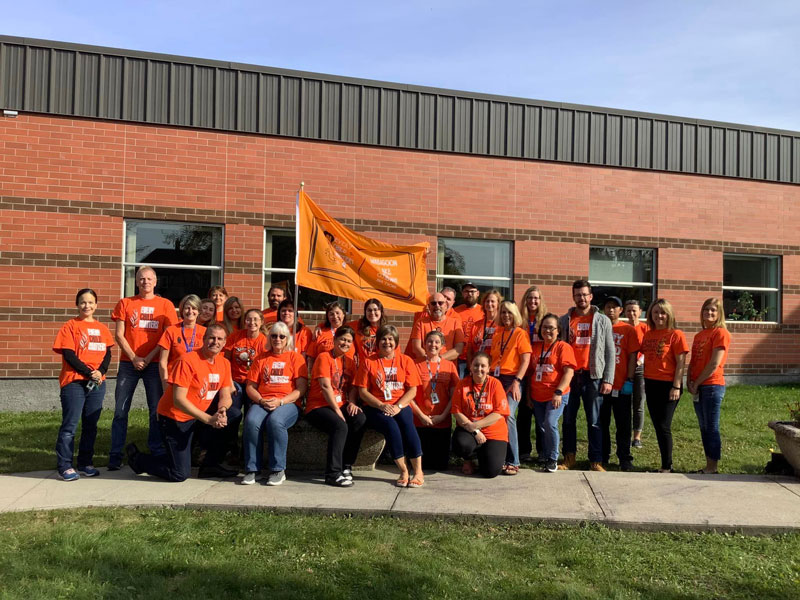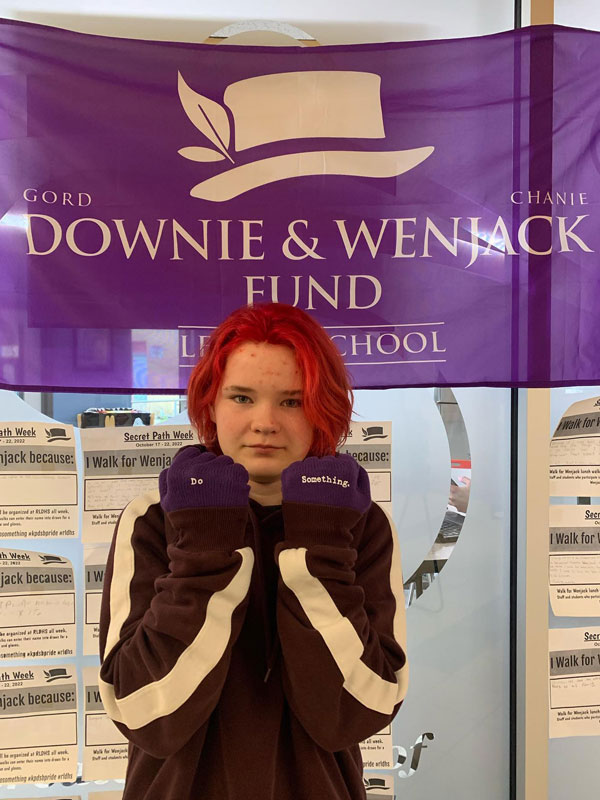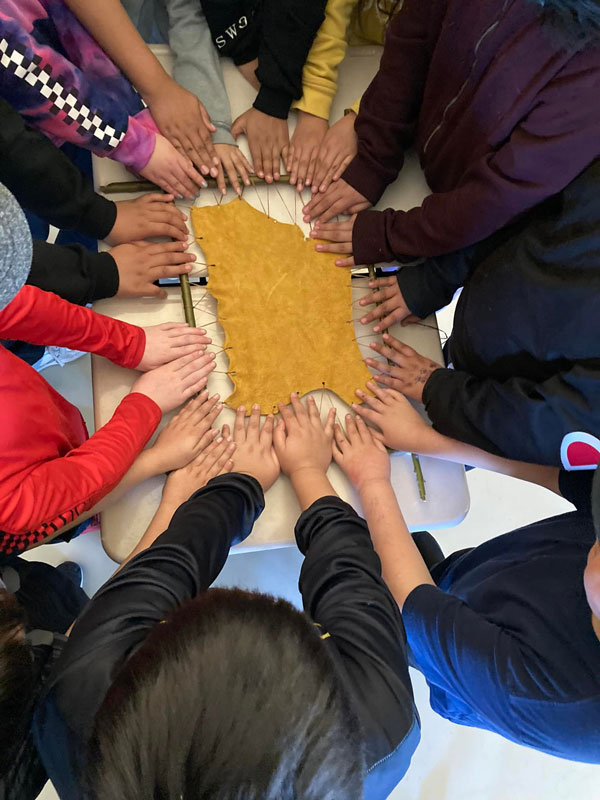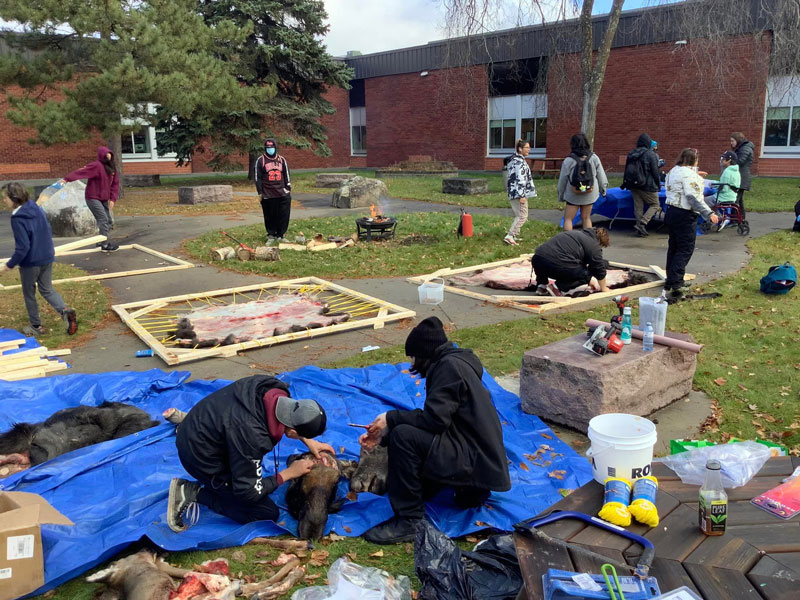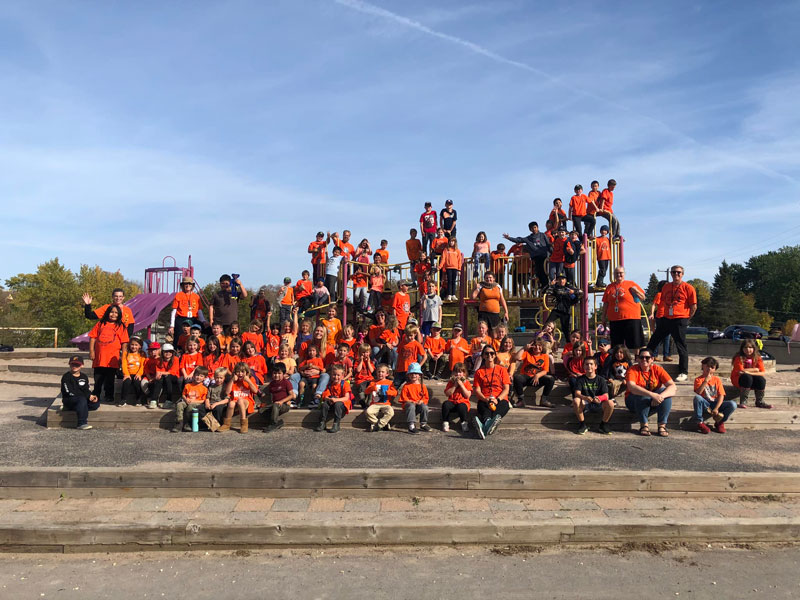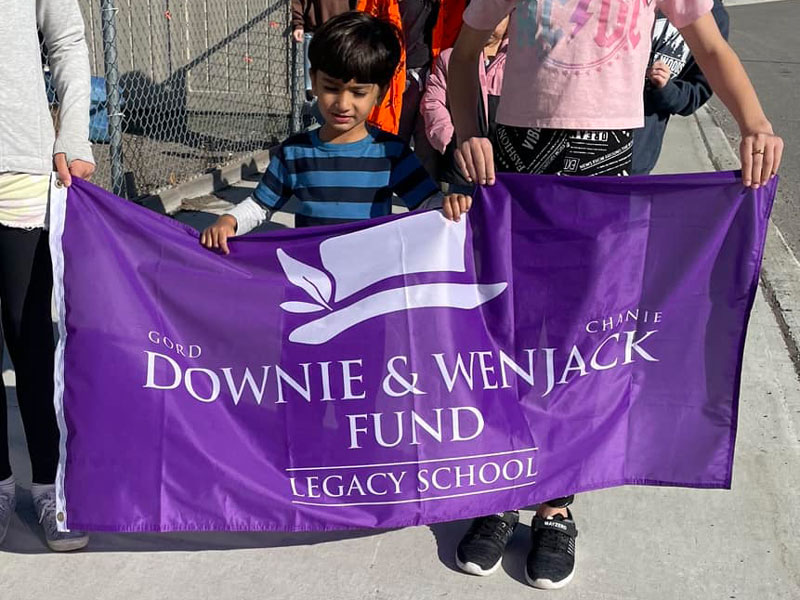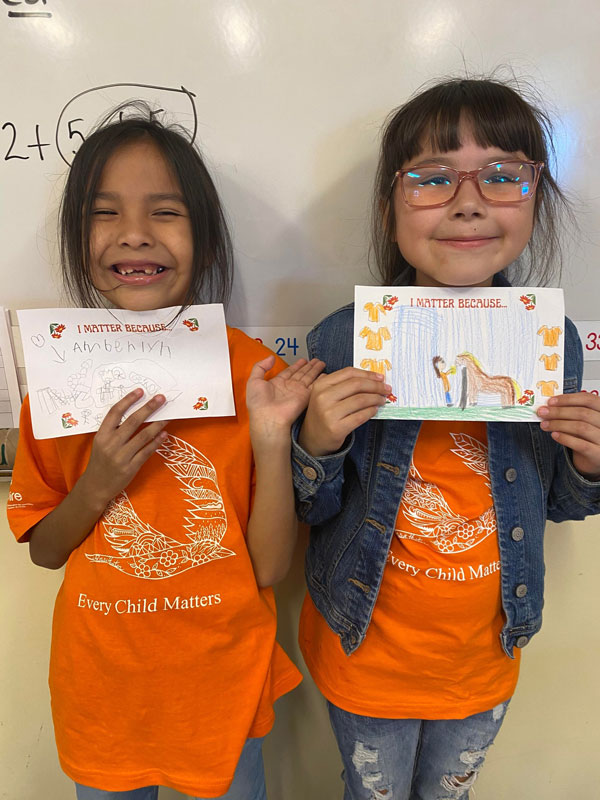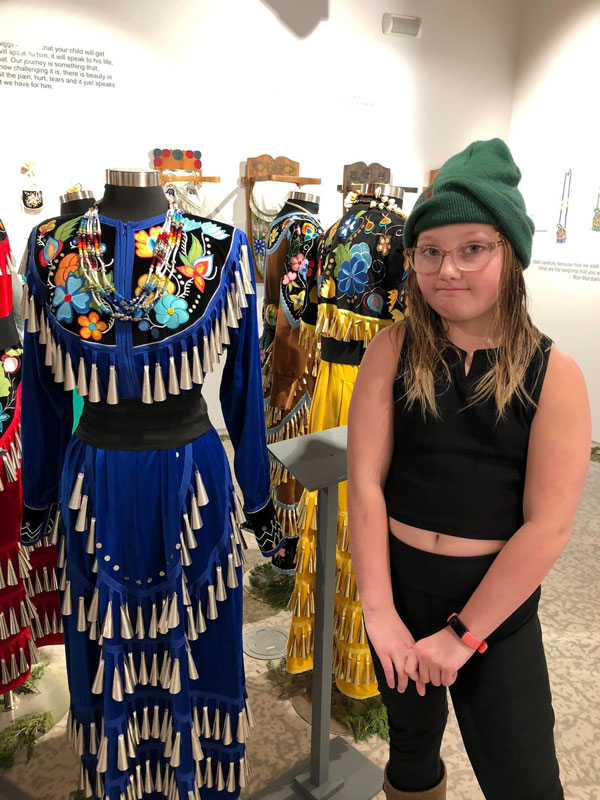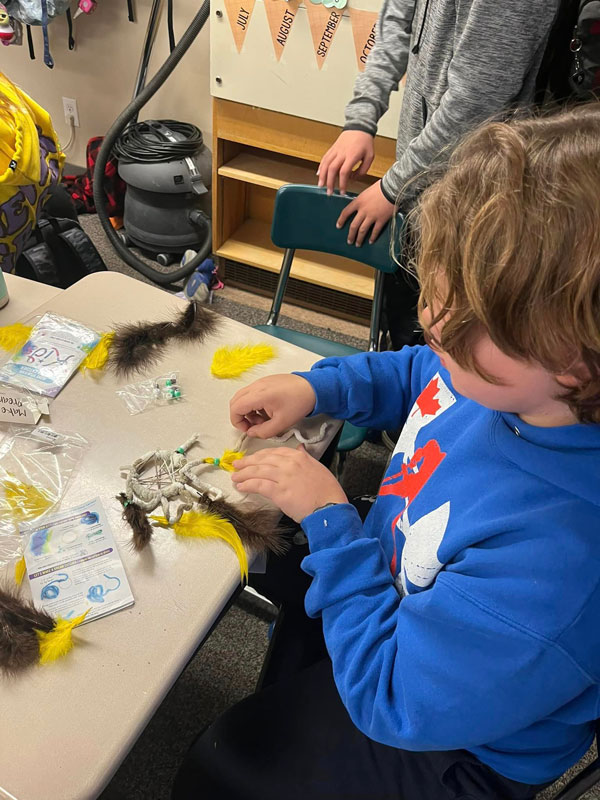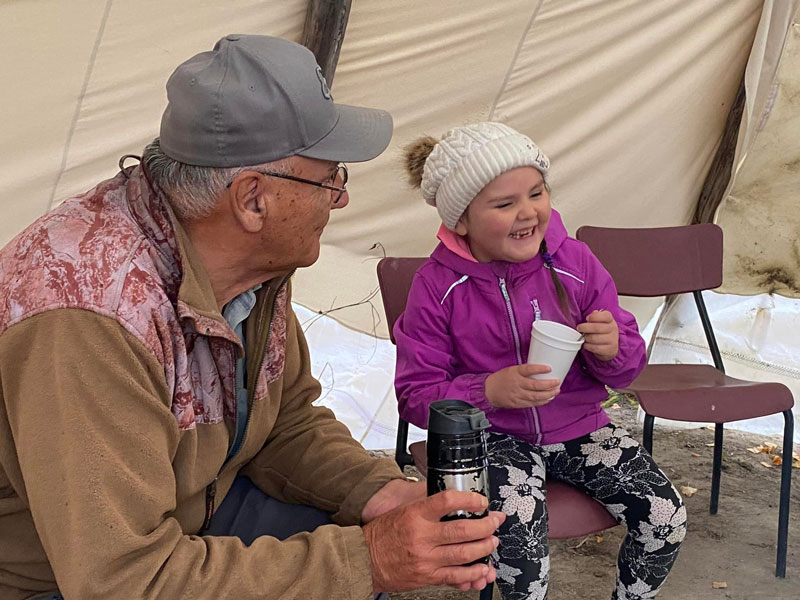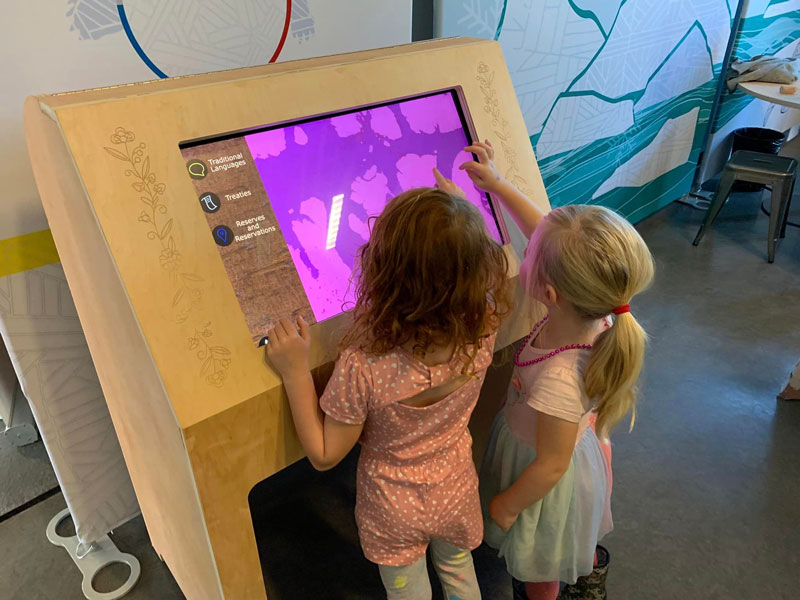Indigenous Education
Achievement
To improve achievement outcomes for Indigenous students at KPDSB, various programs, initiatives, or activities were either initiated or continued during 2022.
One example of these initiatives was the Culturally Responsive and Relevant Pedagogy in Math in the spring of 2022. Open Roads Public School, in partnership with Lakehead University and provincial and local Indigenous artists, helped students connect mathematical processes and curriculum expectations to learning loom beading. This project introduced students to the Indigenous practice of beading and embedded with it math concepts, such as coding, patterning, and other numeracy skills.
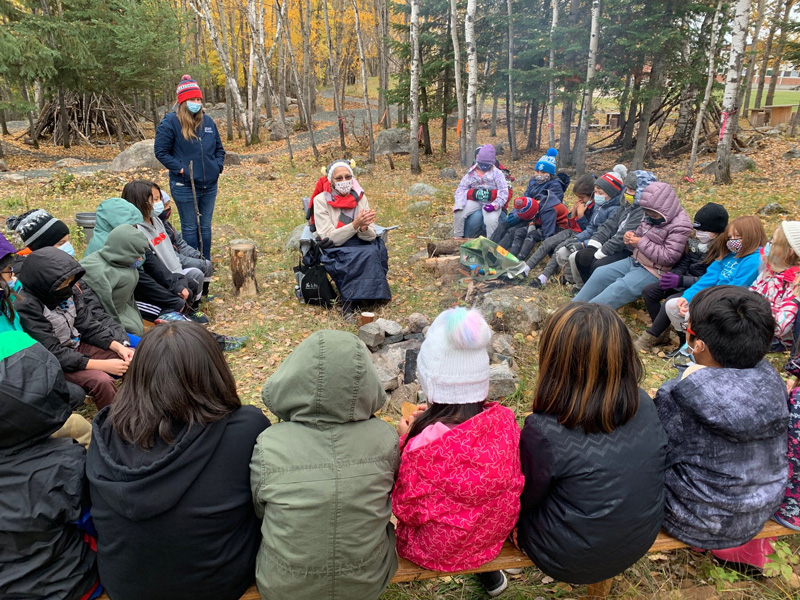
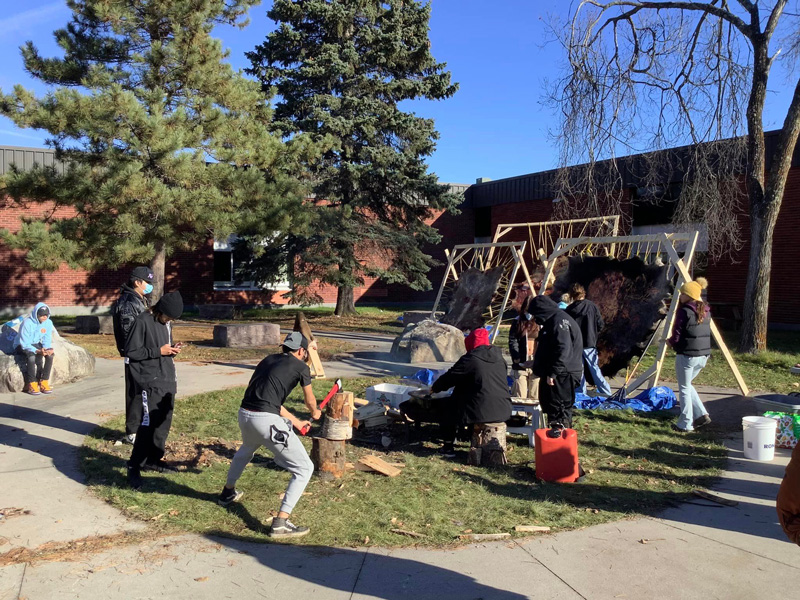
Indigenous Student Mental Health Well-Being and Engagement
Student Voice:
Opportunities to provide platforms for Indigenous student voices have become embedded through many school practices, including talking circles, student-led dialogues, and relationship-building activities.
CRRP Ministry Pilot Project:
Sioux Mountain Public School, Open Roads Public School, and Lillian Berg Public School were part of implementing Culturally Responsive and Relevant Pedagogy, which began by gathering student voices on inclusion and equity concerning safe and inclusive school environments. Students spoke about feeling safe and supported and felt that Indigenous culture was valued by the schools. Concerns were also identified about times when they felt less safe, such as unstructured times during the school day, such as outside during nutrition breaks. The students shared that when reported to principals that they felt that they were supported.
Mental Health Supports:
In addition to the many KPDSB mental health supports, KPDSB schools are reaching out to invite local Elders in to help support students. Elder support models vary between schools and might include Elders in residence or daily invites to support classroom learning, provide cultural support or participate in school activities alongside students.
Other Indigenous Education Initiatives
- KPDSB has committed to reconciliation efforts to minimize systemic racism and the effects of colonialism through the work of the Equity committee and by developing a new policy and procedure to guide this commitment.
- Outdoor learning classrooms and experiential learning opportunities are being developed at schools across the board.
- A KPDSB CRRP website was created to provide educators and schools across the system with resources, guidelines, and connections to local, regional, and national content. Cultural content that focuses on First Nation, Métis, and Inuit is available for staff to support Indigenous pedagogies in the classroom.
- The grade 11 English course option Contemporary Aboriginal Voices (NBE) is offered in all KPDSB secondary schools as a mandatory English requirement. This course includes vetted texts by Indigenous authors and provides students with learning opportunities using Indigenous pedagogy. Teachers of the NBE course are provided with training in order to effectively deliver the course.’· The grade 11 English course option Contemporary Aboriginal Voices (NBE) is offered in all KPDSB secondary schools as a mandatory English requirement. This course includes vetted texts by Indigenous authors and provides students with learning opportunities using Indigenous pedagogy. Teachers of the NBE course are provided with training in order to effectively deliver the course.
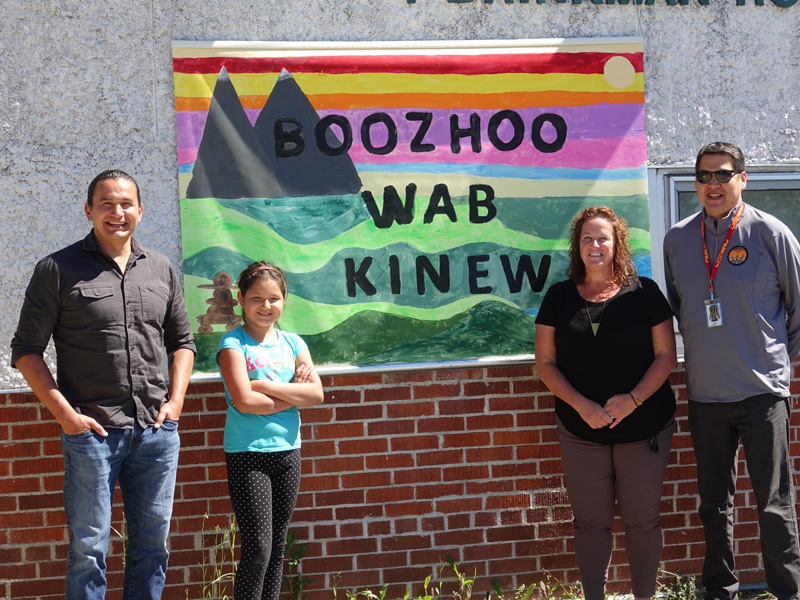
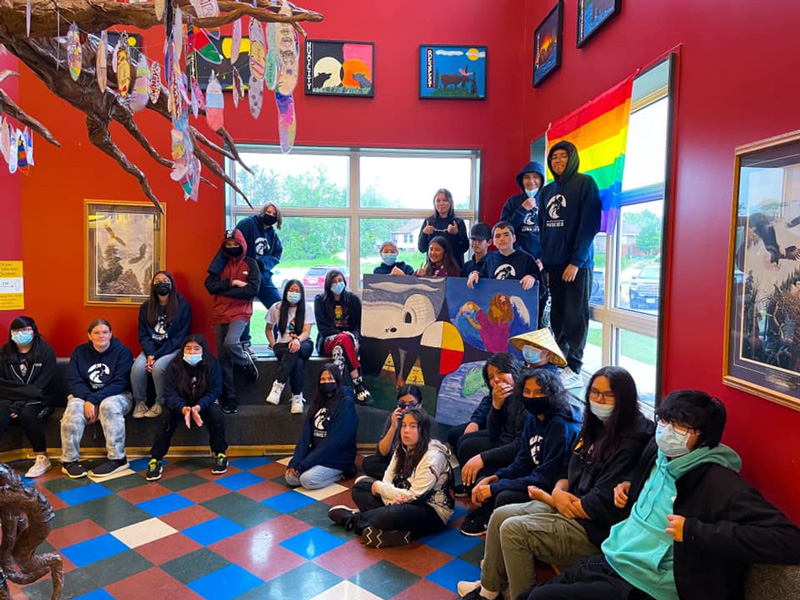
Elders in Residence
Elders have a critical role in their communities and are the keepers and teachers of oral tradition and traditional cultural knowledge, making them an invaluable resource to schools. Through relationships with these Elders, students and staff learn the stories and history of the local people. Using the local dialect and teachings from our area makes teaching and learning especially relevant and engaging for our students. Seeing these leaders in the schools and learning from them give our First Nations students a feeling of identity and pride in that identity. Inviting an Elder into the classroom is a great way of developing relationships with a First Nations community member and not only benefits First Nations students but also helps non-First Nations children to develop a better understanding of First Nations culture and build relationships with First Nations people. Having Elders in the school helps to create a culturally-affirming school environment that helps to connect learning to the cultural background and language of our First Nations students.
Elders bring traditional teachings our students could not otherwise access, such as drumming, beading, traditional cooking or trapping. The gifts given to us by Elders include the experience of learning with them and listening to their stories. When a student can share learning with or from an Elder, it is memorable and works for teaching our students the greater lessons of First Nation, Métis and Inuit values and traditions and helps us take steps toward reconciliation.
Elders in Residence at Sioux Mountain Public School
Sioux Mountain Public School is fortunate to have Elder Nick Kowalow as the Elder in Residence four days per week. This year, intermediate classes are spending two days per week off-site at “Nick’s Nest,” a forested area Elder Nick uses for traditional teachings and ceremonies just a short distance north of Sioux Lookout. While out at Nick’s Nest, students learn more about who they are as individuals while building connections to each other and the land through hands-on activities, exploration, sharing circles and taking part in traditional and cultural teachings and practices. While at school, Elder Nick supports students and staff by sharing his knowledge and many gifts. He facilitates large and small group sharing circles, and many students look forward to these circles each week, often outside around the fire. Elder Nick is often sought out by students who struggle with day-to-day challenges and are looking for someone to talk to. He is always willing to listen and share his personal story to help others.
Elders in Residence at Red Lake-Madsen Public School
“It’s Wednesday!” shout the excited voices of the Spark students as they enter our classroom. For the last five years, the Spark classroom at Red Lake-Madsen Public School has partnered with the Indian Friendship Centre, particularly Diane Bennet, and attended Site 2 to build confidence, self-esteem, perseverance, teamwork, and resilience. In addition, through experiential learning activities such as making crafts, engaging with nature, and exposure to Indigenous culture, students are developing leadership, relationships, and respect for others.
An unintended benefit that has emerged is our relationship with “Elder Ed”, an Indigenous elder from the Lac Seul First Nation, and a regular feature on our Site 2 visits. This relationship has provided meaningful opportunities for reconciliation and understanding of Indigenous histories through Indigenous practices, stories, and worldviews. Each week brings a new surprise—giving students a shared experience, such as moose harvesting, hunting for Chaga, and smudging—that connects their learning to everyday life.
Some experiences are a bit more noteworthy than others. For example, on one occasion, Elder Ed welcomed a discussion about residential schools and some of his pain, and “[We] learned that it was hard for Elder Ed to come to school. When he said he couldn’t come, I was sad, but after our class told him how much we wanted him to come, he showed up, and I was so happy.”
Listening to Ed’s stories of his personal history and his knowledge of the bush and natural medicines has built a connection between him and our classroom. Another unintended consequence was that our students are learning to listen, which is evident when they share Ed’s stories with our staff, their families, and each other. For example, one day, while sitting in a teepee, Ed marvelled at their ability to share what they had learned about Chaga from the previous year with the newer students.
As time passes, the magic of reconciliation happens right before our eyes. Ed shares his knowledge and experiences, and the students share their lives, classroom culture, and love of learning. Although unintended, the mutual respect and relationship that has evolved between Ed and the SPARK students are magical.
Below are some notable quotes from our SPARK class that students felt were very important to include.
- “Remember when we learned that Elder Ed used all the parts of the grouse that he shot?”
- “He said he didn’t have a lot of toys and he would use the stomach as a balloon. It was kinda gross when he blew it up for us to see!”
- “Remember how we held a funeral for the birds outside, which was our way of showing respect to the animal?”
- “Elder Ed taught us to be respectful to the animals that are hunted.”
- “I know Elder Ed’s favourite drink is Chaga because it is a medicine that helps with sore throats, pains, and headaches.”
- “Elder Ed taught us that sap was good for us because it has powerful medicines that were used for toothaches when he was a kid. He also used it as gum.”
- “Elder Ed is very important to us because every Wednesday, he teaches us something new.”
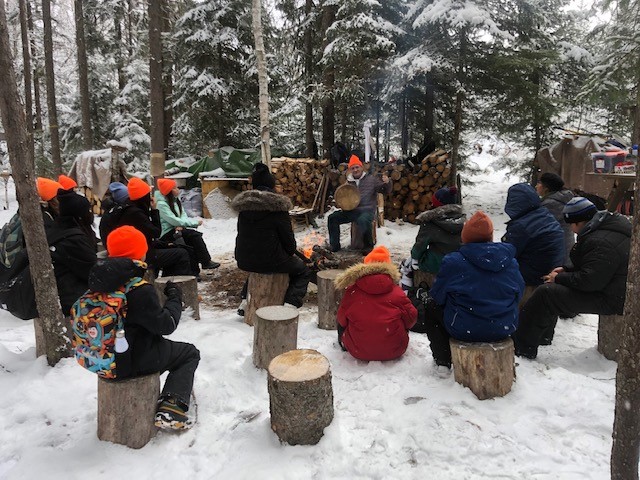
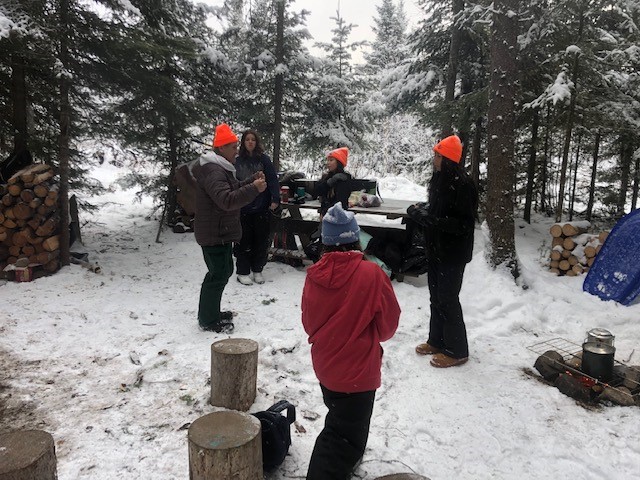
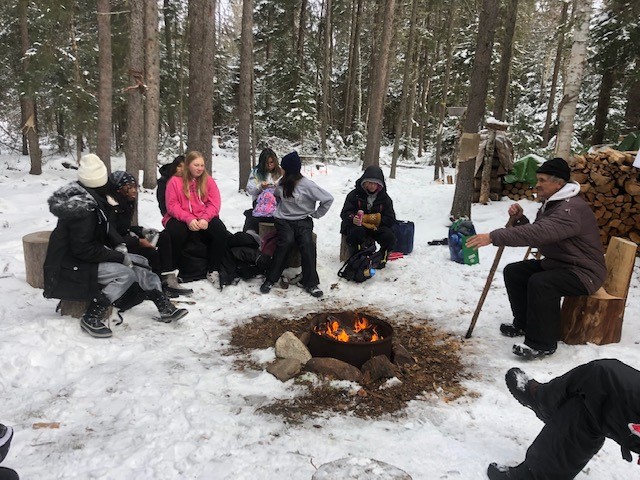
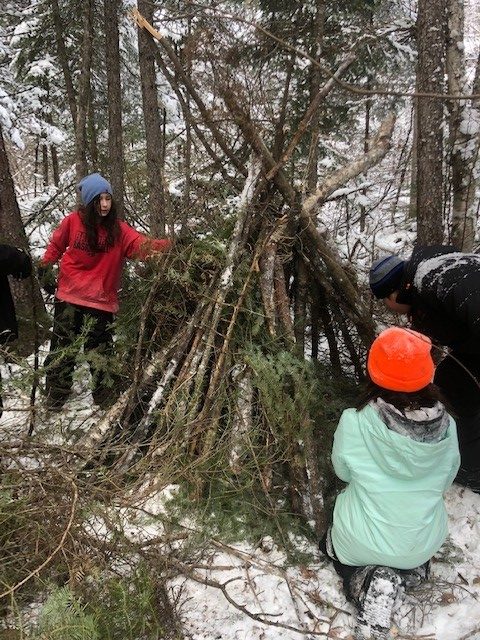
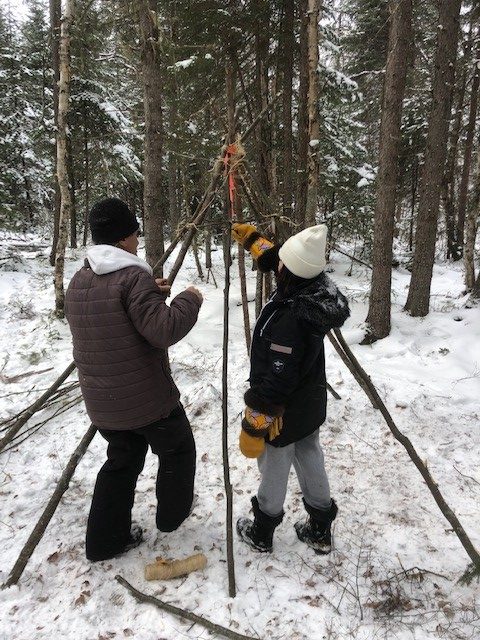
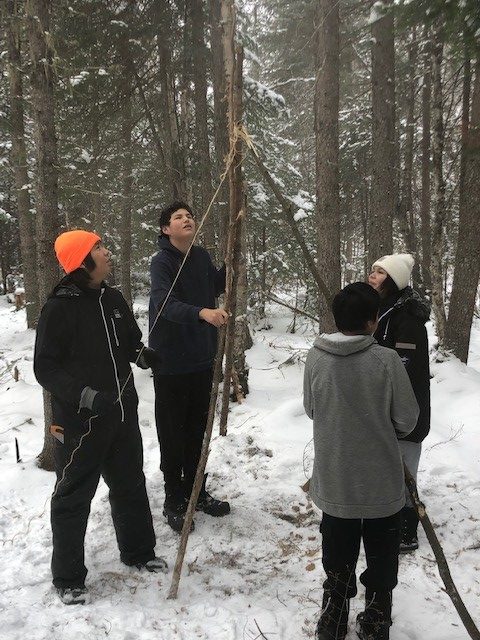
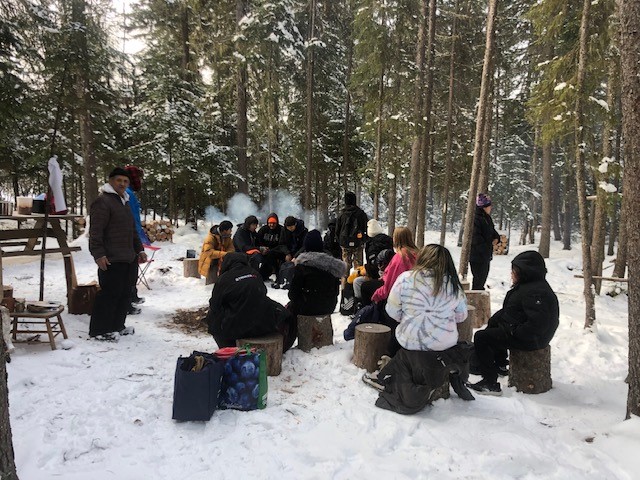
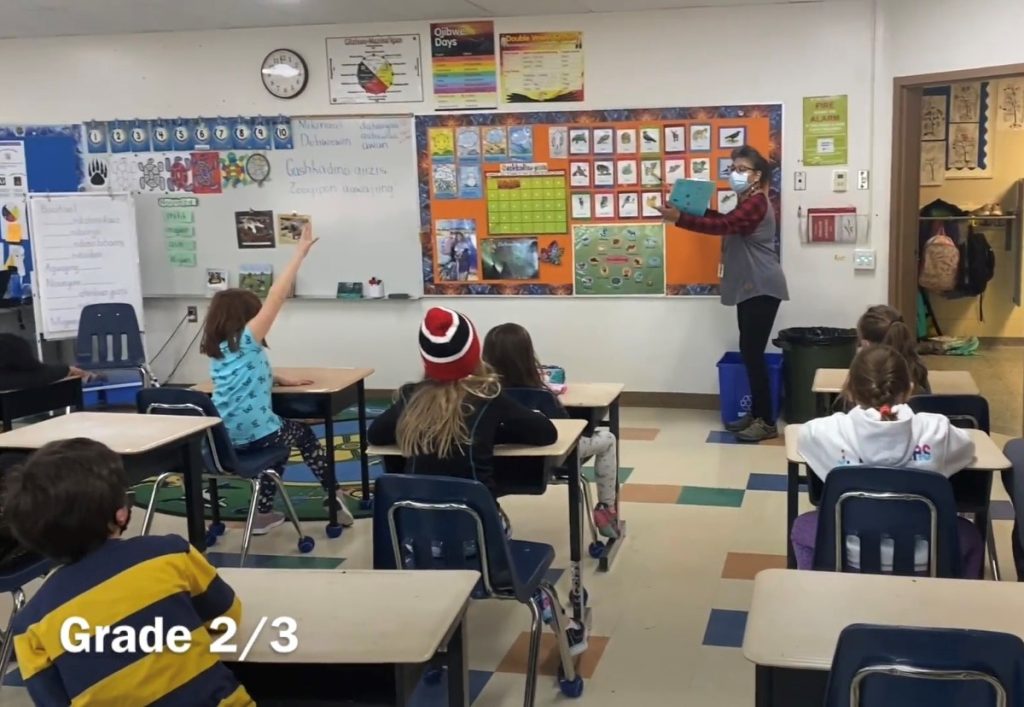
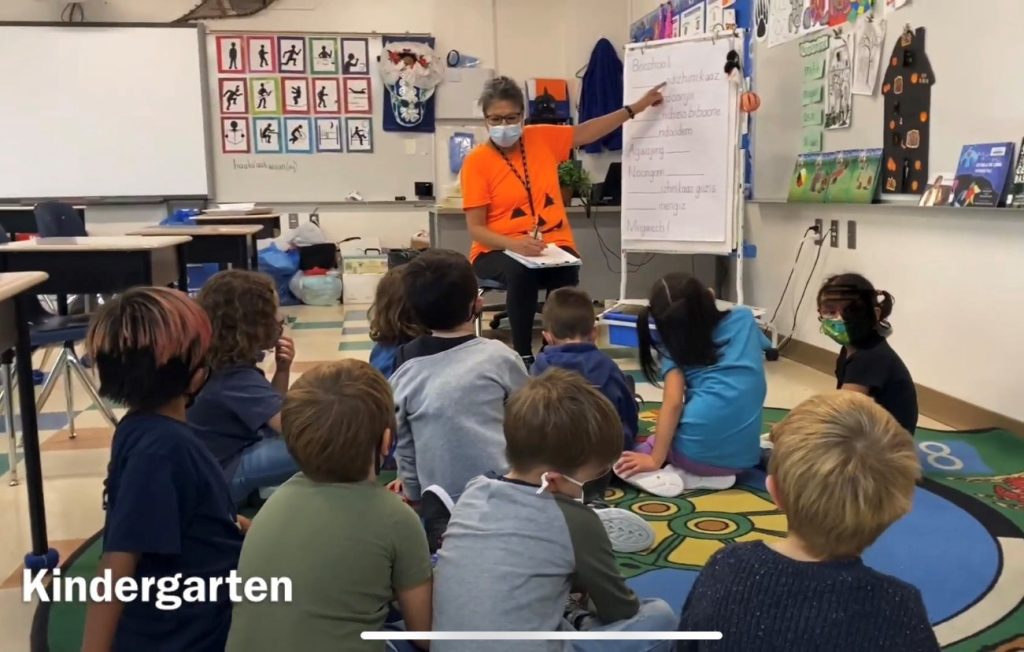
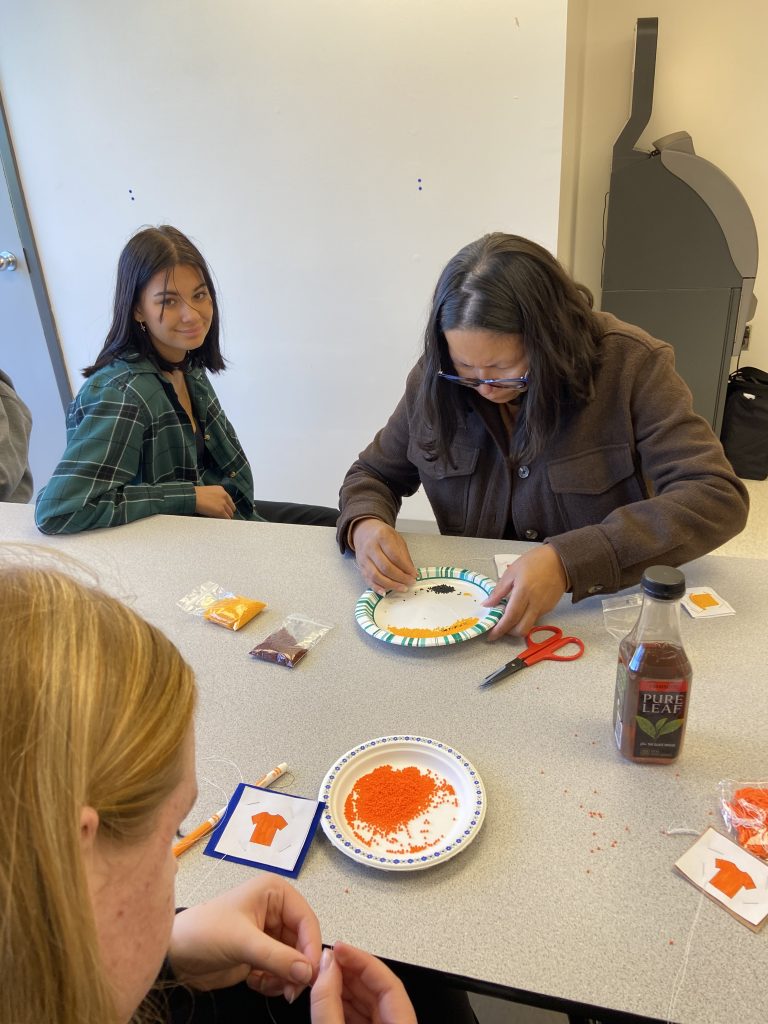
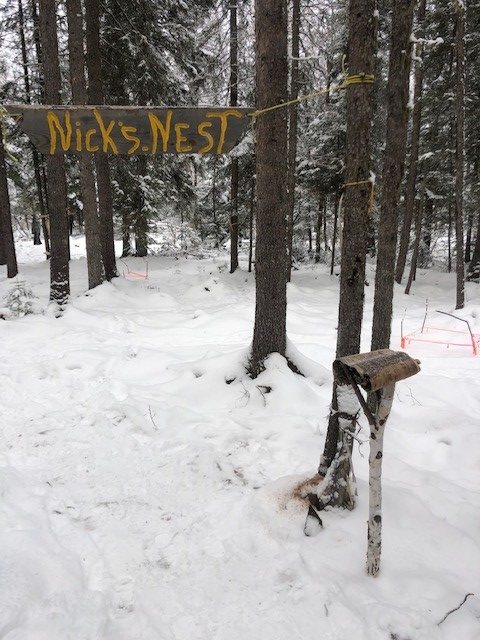
Policy & Procedure 505: Indigenous Education
Through the work of the schools and the Indigenous Education Advisory Committee, as well as work through the KPDSB Equity Committee, we continue to identify barriers that impact Indigenous students, families, and partners. The development of Policy & Procedure 505: Indigenous Education took place during the 2021–2022 school year. The intent of this policy and procedure is to understand that the KPDSB has a responsibility to act upon, reconcile, and be accountable for addressing the impacts of colonialism. It publicly states and recognizes that each student has the right to an education that is free from harmful dominant narratives, implicit bias, racism, and discrimination. It ensures that it is publicly stated that as a public school board, the Keewatin-Patricia District School Board believes in the inherent human dignity of all people.
Honouring Indigenous Days of Importance During the School Year
All KPDSB schools recognize and honour a number of Indigenous Days of significance during the school year. These days provide opportunities for in-depth learning and often include Elders and Knowledge Keepers as well as community partners and families. We wish to thank everyone who makes these opportunities for learning a reality in our school and communities.
Powley Day – September 19
Each year, communities across Ontario celebrate Powley Day on September 19th, marking the anniversary of the landmark Métis rights victory at the Supreme Court of Canada. Powley Day marks the most important Métis Rights recognition since the days of Louis Riel.
On October 22, 1993, father and son, Steve and Roddy Powley killed a bull moose just outside Sault Ste. Marie, Ontario. They tagged their catch with a Métis card and a note that read “harvesting my meat for winter”. One week later, the Powley’s were charged by Conservation Officers for hunting moose without a license and unlawful possession of moose contrary to Ontario’s Game and Fish Act (R. v. Powley booklet, p. 2, MNC)”. The Métis Nation of Ontario (MNO) led the defence throughout the various levels of the court providing political and financial support to the Powley family. The Powley’s case was identified as a test case to bring forward Métis rights, specifically harvesting rights, which had been denied by the Ontario government.
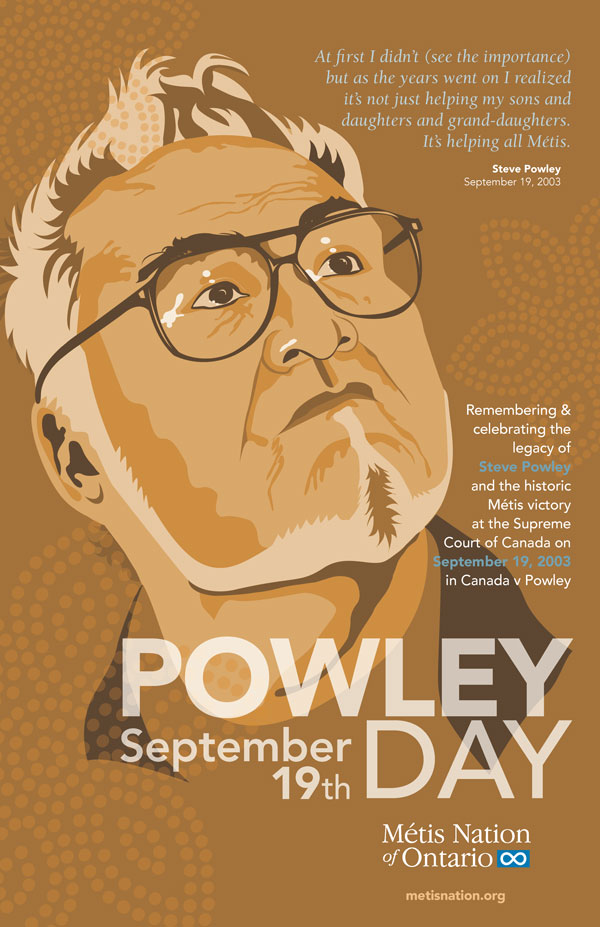
National Day for Truth and Reconciliation/Orange Shirt Day – September 30
September 30, 2022, marked the second National Day for Truth and Reconciliation as a federal statutory holiday. The day honours the lost children and Survivors of residential schools, their families and communities. Public commemoration of the tragic and painful history and ongoing impacts of residential schools is a vital component of the reconciliation process. Orange Shirt Day is an Indigenous-led grassroots movement that honours the children who survived Indian Residential Schools and remembers those who did not. This day relates to the experience of Phyllis Webstad, a Northern Secwpemc (Shuswap) from the Stswecem’c Xgat’tem First Nation, on her first day of school, where she arrived dressed in a new orange shirt, which was taken from her. It is now a symbol of the stripping away of culture, freedom and self-esteem experienced by Indigenous children over generations.
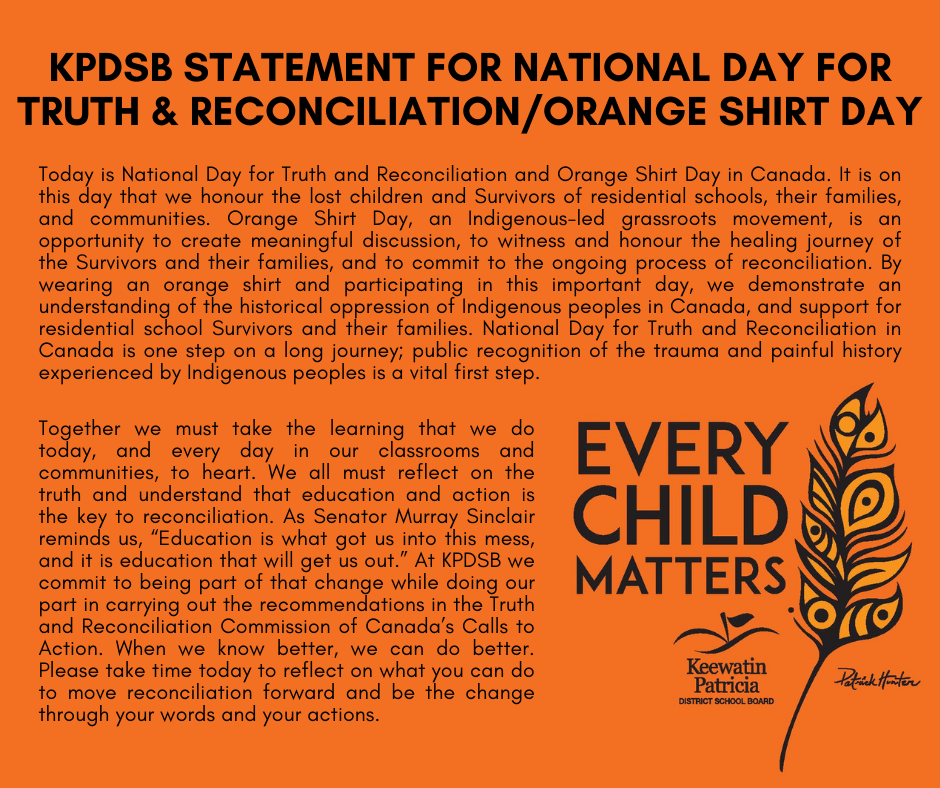
Secret Path Week/Walk for Wenjack – October 17-22
All KPDSB schools are Downie Wenjack Legacy Schools. In fact, Crolancia Public School in Pickle Lake was the first legacy school in Canada! The Legacy Schools program is a national initiative to engage, empower and connect students and educators to further reconciliation through awareness, education and action (#reconciliACTION). Secret Path Week, which includes Walk for Wenjack events, took place October 17-22, 2022. Secret Path Week is a national movement commemorating the legacies of Gord Downie and Chanie Wenjack, and takes place annually from October 17-22. This is a meaningful week as October 17th and 22nd respectively mark the dates that Gord Downie and Chanie Wenjack joined the spirit world.
The Downie Wenjack Fund calls on all people in Canada to use Secret Path Week to answer Gord Downie’s call to action, to “Do Something” by creating a reconciliACTION and furthering the conversation about the history of residential schools.
Treaties Recognition Week – November 6-12
This annual event offers us the opportunity to honour the importance of treaties and helps our students, families and communities learn more about treaty rights and relationships. By learning more about our collective treaty rights and obligations, we can create a greater understanding and nurture relationships between Indigenous and non-Indigenous peoples.
Treaties Recognition Week represents one of many steps on Ontario’s journey of healing and reconciliation with Indigenous peoples and is just one of the many ways that schools across the KPDSB can embed learning in our classrooms. Recognizing this week allows us to increase treaty awareness and provides students and our communities with an important opportunity to learn why treaties matter to all Ontarians. We are all treaty people and we embrace our responsibility to honour all our relations.
Louis Riel Day – November 16
Louis Riel Day is a time to recognize and respect the history, culture and identity of Métis people. The Métis are recognized as one of the Indigenous Peoples of Canada by the Constitution Act of 1982.
“Louis Riel fought for the very values that Canadians hold dear — equality, pluralism, and social justice. His many sacrifices have secured him an enduring place in our shared history as a champion of the Métis people, a founder of Manitoba, and a key contributor to Canadian Confederation.”
– Carolyn Bennett, Indigenous Affairs Minister
National Day of Awareness for Missing and Murdered Indigenous Women and Girls and Two-Spirit People – May 5
May 5 is the National Day of Awareness for Missing and Murdered Indigenous Women and Girls and Two-Spirit People (MMIWG2S). It is widely recognized as Red Dress Day, a day to recognize, honour and raise awareness.
National Indigenous History Month & National Indigenous Peoples Day – June
June is National Indigenous History Month and June 21 is National Indigenous Peoples Day. This is a time for all students and staff to reflect on the history, cultures, contributions, and strengths of our First Nations, Inuit, and Metis Peoples. This is an opportunity to create spaces in our classrooms and schools to include cultures and embed relevant resources to include all students so they can see themselves positively represented.
National Indigenous History Month invites Indigenous Peoples to celebrate their history in the spirit of pride and preservation. For non-Indigenous Canadians, it is an opportunity to learn and show recognition of the role Indigenous Peoples have played and continue to play in shaping Canada.
